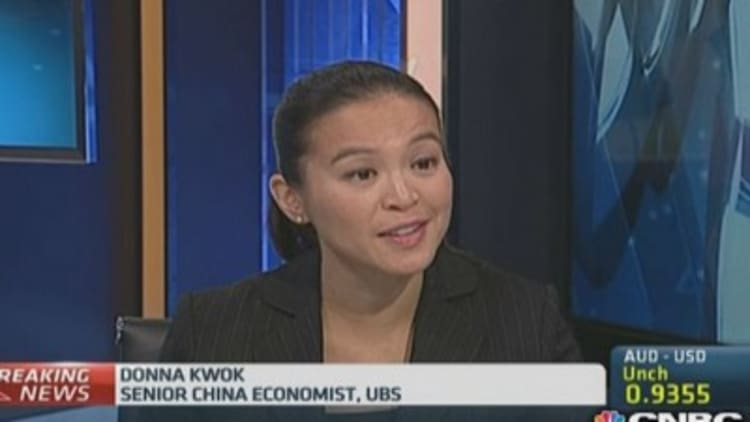
China's annual consumer inflation rose 2.5 percent in May, faster than April's 1.8 percent rise, data on Tuesday showed.
The May consumer price index (CPI) was just above analyst forecasts in a Reuters poll for a 2.4 percent increase.
Read MoreChina targets rural sector in reserve requirement cut
"It was largely in line with our expectations for two key reasons," Donna Kwok, senior China economist at UBS, told CNBC.
"First of all, the base effect was lower and most importantly, food prices have finally started to rise again. Within that, pork prices in particular have started to rise again as a result of a government's reserve program which recently kicked in," she added.
Producer prices in China fell 1.4 percent on-year in May, compared with expectations for a 1.5 percent fall.
"The PPI, although less reflected in headlines, is also important because it shows you how much onshore material prices are going up. And at the moment for May, it's mostly flat which suggests that domestic demand is still quite weak, as last week's import number show," said Kwok.
Trade data released on Sunday showed China's imports fell 1.6 percent on-year in May, compared with market expectations for a 6.1 percent rise.
Read MoreWhat falling imports mean for China's economy
The recent fall in producer prices has fueled talk that the world's second-largest economy is facing deflationary pressures.
China is not the only economy facing deflation risks. Last week, the European Central Bank unveiled a number of measures including interest-rate cuts to boost the euro zone economy and boost very low inflation.
As the ECB delivers, a euro trend change is at hand
Analysts said Tuesday's inflation data suggested China's central bank had further room to loosen monetary policy later this year to support the economy.
China's central bank said late Monday that it would cut the reserve requirement ratio for banks that have sizable loans to the farming sector and small-and-medium-sized firms to support the economy.
It was the second time since April the central bank has lowered reserve requirement ratio for some banks.
"China's May inflation data give the government latitude for policies like yesterday's targeted reserve requirement cut, which looked to be more about fostering competition in China's financial sector than about spurring faster credit growth," Bill Adams, senior international economist for PNC Financial Services Group, said in a note.
Asian markets showed little immediate reaction to the Chinese inflation data.
The Australian dollar traded flat against the greenback at $0.9357 and Asian stock markets were all modestly higher with the exception of the Nikkei.

